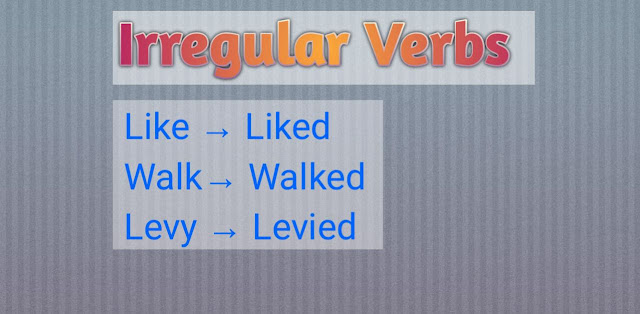Are you confused about irregular verbs and how they're conjugated? If yes, then this article on regular verbs is just for you. Irregular verbs in English are the verbs that follow different patterns of conjugation [formation of past tenses]. You need to learn irregular verbs by heart as they don't follow the same usual patterns of past tense formation.
This article deals with the following sub-topics:
1. Irregular verb definition
2. Irregular verb grouping
3. FAQs - Irregular verbs
What are irregular verbs?
Verbs that "follow their own rules" in the formation of their past tense forms could be categorized as irregular verbs. Regular verbs form the past tense and past participle by adding "-ed" or "-d" in accordance with regular English grammar norms. However, when irregular verbs are the primary verbs in a sentence, they use entirely different terms for each of their several verb forms.
Compare carefully the past tense forms of irregular verbs with those of regular verbs in the following examples.
Examples of Irregular Verbs:
a. Put Put Put
b. Bend Bent Bent
c. Begin Began Begun
Examples of Regular Verbs:
a. Walk Walked Walked
b. Start Started Started
c. Remember Remembered Remembered
Irregular verbs are not governed by any rule of pattern which creates difficulty to learn them; therefore, you need to use a different approach when learning the irregular verbs. That approach is grouping the irregular verbs.
Grouping of Irregular Verbs
If you've read the examples of irregular verbs given above, you may have noticed that irregular verbs can be grouped in three broad categories. They're given below.
A List of Irregular Verbs of This Category
- 1. Put Put Put
- 2. Hurt Hurt Hurt
- 3. Shut Shut Shut
- 4. Burst Burst Burst
- 5. Broadcast Broadcast Broadcast
- 6. Shed Shed Shed
- 7. Let Let Let
- 8. Bet Bet Bet
- 9. Hit Hit Hit
- 10. Set Set Set
- 11. Spread Spread Spread
- 12. Cast Cast Cast
- 13. Thrust Thrust Thrust
A List of Irregular Verbs of This Category
- 1. Bend Bent Bent
- 2. Find Found Found
- 3. Fight Fought Fought
- 4. Send Sent Sent
- 5. Think Thought Thought
- 6. Bring Brought Brought
- 7. Light Lit Lit
- 8. Catch Caught Caught
- 9. Teach Taught Taught
- 10. Hear Heard Heard
- 11. Build Built Built
- 12. Understand Understood Understood
- 13. Have Had Had
A List of Irregular Verbs of This Category
- 1. Begin Began Begun
- 2. Write Wrote Written
- 3. Show Showed Shown
- 4. Arise Arose Arisen
- 5. Blow Blew Blown
- 6. Sing Sang Sung
- 7. Sink Sank Sunk
- 8. Break Broke Broken
- 9. Give Gave Given
- 10. Fly Flew Flown
- 11. Ride Rode Ridden
- 12. Take Took Taken
- 13. Shrink Shrank Shrunk
Examples of Irregular Verbs in Sentences
1. He wrote a letter to his mom.
2. Allen stood up when the teacher entered.
3. He has learnt a new poem
4. She reads newspaper daily.
5. Rahul runs very fast.
6. Priya sat on the floor.
7. They sing rap songs.
8. Plants grow rapidly.
9. His dress is hung on the wall.
10. John drew a new sketch.
More Irregular Verbs in Past and Past Participle Forms
- Draw drew drawn
- Teach taught taught
- Hang hung. Hung
- Write wrote. written
- Buy bought. Bought
- Dig dug. dug
- Hear. Heard. Heard
- Catch caught. caught
- Forget forgot forgotten
- Blow. Blew. Blown
- Stand stood. Stood
Irregular verbs Exercises
Q 1: Tell which of the following verb are regular verbs or irregular verbs.
1) Ring
2) Feel
3) cook
4) fly
5) stop
6) kill
7) pour
8) hang
9) blow
10) stop
11) Hit
12) greet
13) Move
14) Remember
15) miss
Q 2: Use the base form (1st form) of the irregular verbs from brackets and complete the following sentences.
1) He _______(brought) a pen for me.
2) Our teacher _________(taught) well.
3) He ________(stood) up.
4) Abdul always _________(sat) on first bench.
5) Riya ________(drew) nice paintings.
6) The wind_(blown)
7)He _________( forgotten) everything.
8) Ramsha__(rang) the bell when she comes.
FAQs - Irregular Verbs
What are regular and irregular verbs?
Regular verbs follow the same pattern of conjugation and usually end in "-d," "-ed" or "-ied" as in saved, walked and married, whereas irregular verbs don't follow the same pattern of conjugation and don't end in "-d," "-ed" and "-ied" as in begin, began, begun.
Give some examples of irregular verbs.
Hang
Write
Draw
Teach
Buy
Bring
Feel
Stand






0 Comments
Please do not enter any spam link in the comment box.